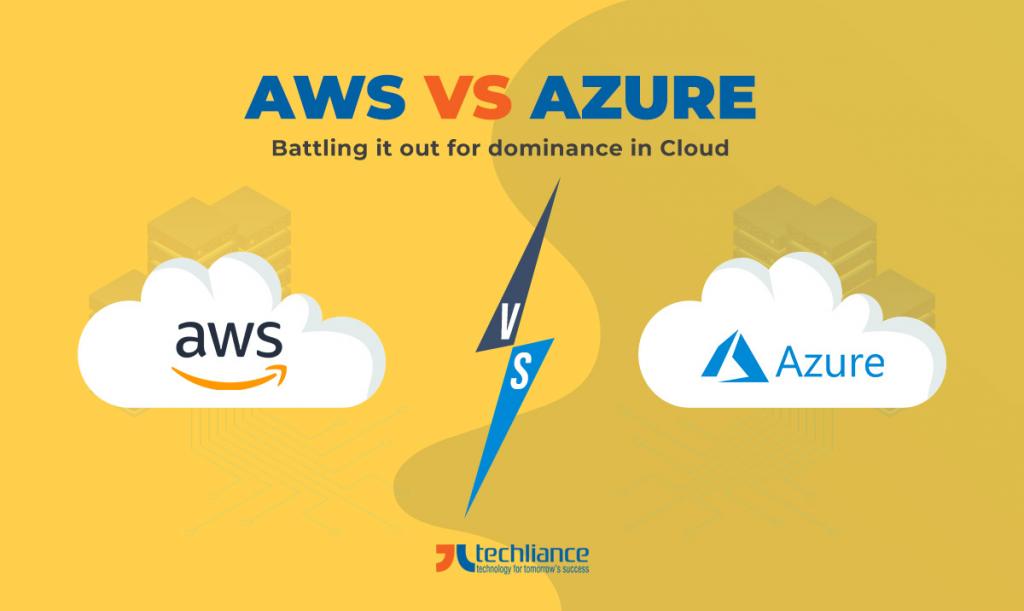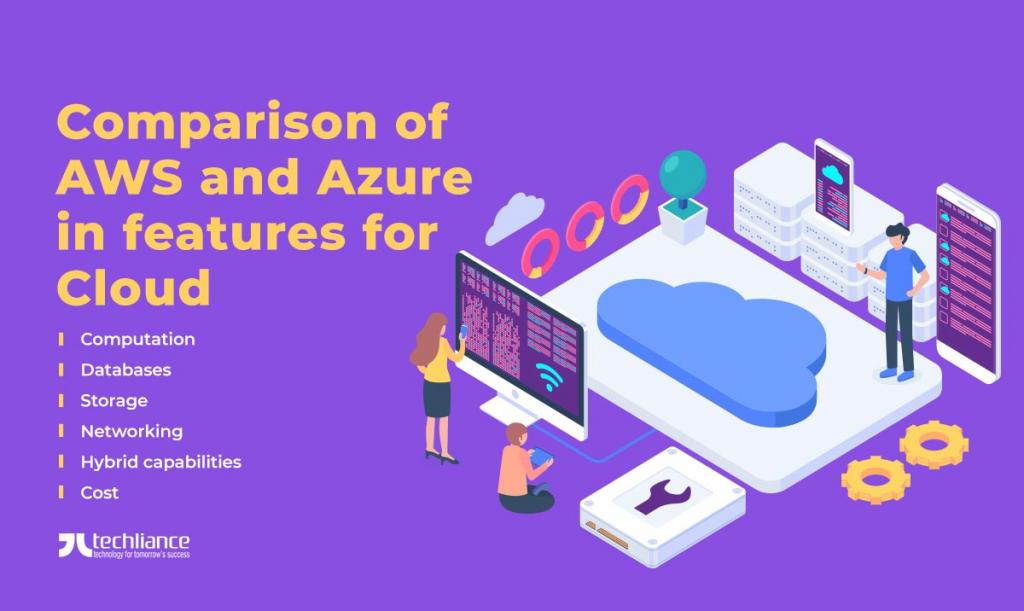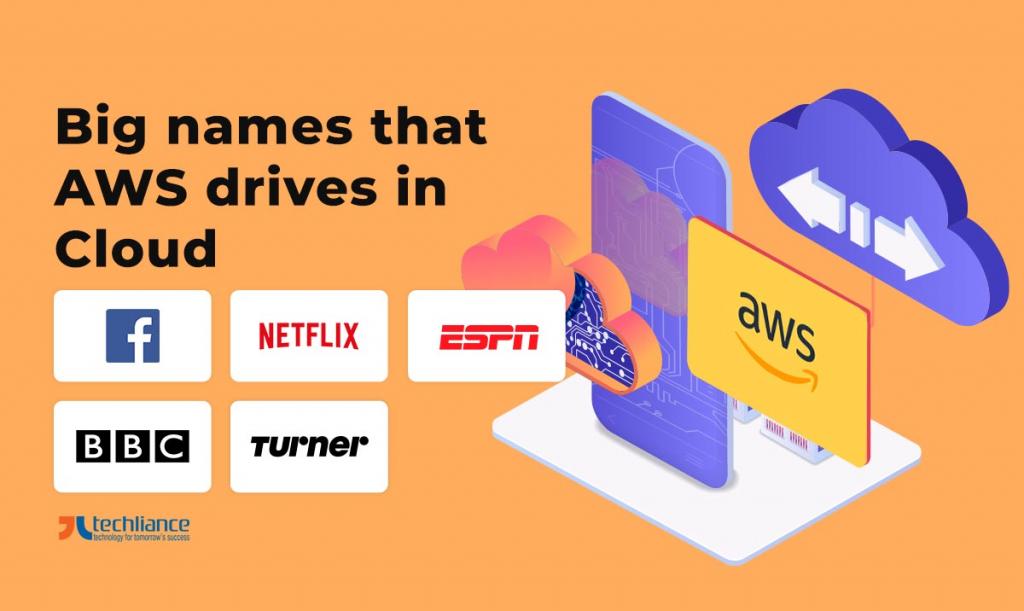Today’s world is all about empowering businesses through technology. Globally, the concept of cloud computing has taken us all over quite rapidly. The majority of companies do a comparison like AWS vs Azure to opt for the best cloud services during 2024.
Amazon as a pioneer joined cloud computing with Amazon web services (AWS) in March 2006. However, Microsoft decided to not stay far behind and launched Azure with competitive abilities in October 2008. Presence in the web services market since July 2002 hands Amazon an advantage in AWS vs Azure showdown.
In this article, we will attempt to touch the surface of these powerful cloud platforms. Because both AWS and Azure are so vast and extensive. So, we compare various aspects of cloud computing relating to IT support & DevOps services for business.

A closer look at AWS
Amazon has always been a front-runner with its web services. Their continuous streak remains in the public cloud market globally and the USA. They are the biggest market share leader in cloud IaaS for the past decade or so.
AWS is massive, with a wide array of services and a network of data centers that are spread worldwide. Accordingly, this brings the aspect of operations into the spotlight. Amazon has been around the block for the longest time as an enterprise solution provider. So, it makes them widely accessible to a larger user base.
However, with so much to offer AWS is struggling to keep costs at a lower rate. Their cost structure seems a bit difficult for small businesses and startups to digest. Presently, the biggest challenge is to run a high volume of services and the associated workload with them.
A sneak peek at Microsoft Azure
Microsoft is a major market shareholder for the operating system and other related software. Making a great plan for Microsoft to onboard the cloud computing train was simple. Also, its user base was thoroughly open to joining the cloud.
The biggest ally for Microsoft lies with a long lineage of association with the customers. They have seen the company and products grow in all these years. Henceforth, the same consumer base extended the patronage in embracing enterprise-based solutions.
Microsoft easily took all of its on-premises software on the cloud. The list includes some of the very popular and well-known software. For example, Windows Server, Microsoft Office, SQL Server, Sharepoint, Dynamics, Active Directory, .NET, and many others.
Comparison of AWS and Azure in features for Cloud
Here is a direct assessment of AWS and Azure to understand the competencies of each platform in 2024.
- Computation
- Databases
- Storage
- Networking
- Hybrid capabilities
- Cost

Let’s round up some of the basic elements and features of AWS and Azure.
Computation
AWS offers customizable EC2 instances when it comes to computation. Also, it provides other facilities including Elastic Beanstalk and EC2 container services. KCS for Kubernetes, Lambda, and Autoscaling make AWS perfect for the cloud.
Computation in Azure revolves around Virtual Machines. Also, it has other tools including Cloud Services and Resource Manager. This enables small businesses and large enterprises in deploying applications on the cloud.
Databases
Both AWS and Azure support relational databases. For instance, Amazon Relational Database Service and Azure SQL Database. Whereas, they also have a NoSQL database in the form of Azure DocumentDB and Amazon DynamoDB.
Storage
AWS presents the following options for storage in the cloud.
- Elastic Block Storage EBS
- Simple Storage S3
- Elastic File System EFS
Cloud storage in Azure comprises these choices.
- Azure Storage Service
- Table, Queue, and File Storage
- Azure Blob Block storage
Networking
Both AWS and Azure have great networking capabilities. They offer automated server load balancing. Also, they provide connectivity to on-premise systems.
Hybrid capabilities
Internationally and in the United States, businesses are becoming multi-faceted over time. Today, having a cloud provider that can service multi-cloud needs is necessary. In short, it’s time to go hybrid or stay out of the competition.
Nowadays, many companies want to maintain on-premise applications. Also, they look to deploy multiple vendor infrastructures. This means getting some sort of a hybrid solution the way to go.
Microsoft is among the forerunners in providing the option for hybrid deployments with its Azure stack. Thus, companies can deploy their hardware and software on the Azure public cloud services. All thanks to a local data center with a shared management portal, code, and APIs.
AWS is not far behind Azure on the hybrid front. Amazon launched a fully managed service with their hybrid cloud in 2018. Therefore, it delivers pre-configured racks to premises where WAS services can be run easily in the data center.
Cost
Until now, both platforms are head-to-head in terms of the services and extension of support to their users. Cost is a huge element in how a cloud platform is received in the market. The best part is that there are different pricing models, with various discount offerings for customers.
AWS and Azure offer cost tiers based on the organization level, capacity and needs to help you make a decision. Their prices vary on basis of your selection of cloud computing capacities. So, instead of unveiling the price plans, we are leaving them for you to evaluate on services.
AWS vs Azure: Who has got who with them?
Having a great customer line means that you have all the leading names vouching for you in the market. Also, this helps you gain the much-needed traction and be the leader in the main league. The features, cost plans, and services dictate the kind of clientele held by the platform. However, it also depends on the right tools and effective marketing strategy.
Big names that AWS drives in Cloud
Being first in the game helps AWS in acquiring and retaining a handsome market share on large customer deals. Even, it enabled the US Central Intelligence Agency (CIA) in 2013 to build their private cloud. If the most reliable intelligence bureau is relying on AWS, then clearly the merit for recognition goes to AWS.
The next AWS client to look upon is a familiar one, as most of us are also their customers. This means we all are inadvertently using AWS in a way. Yes, we are talking about Netflix. It decided to shut down all of its data centers to completely move to the cloud in 2016.

Some other noteworthy patrons of AWS contain the following.
- ESPN
- BBC
- Turner Broadcasting
Clients that Azure powers in Cloud
Azure does not hold a massive customer profile in comparison to AWS. But Microsoft widely markets AWS as a cloud SaaS tool for vendors. Some high-profile customers of Azure are as follows.

- Verizon
- NTT America
- News Corp
- LG Electronics
Conclusion
Comparing the two platforms has been quite an insightful discussion where it seems both are neck-to-neck in all aspects. However, Azure joined cloud computing marketing six years later than AWS. This gives AWS the competitive advantage of being in the market for a longer time.
AWS has been very smart in developing a wider infrastructure. Also, they are expanding on the aspect of highly scalable services. Hence, the initial momentum, market capture, and front-runner aspects are with AWS.

Microsoft Azure has equal potential, with its capacity to grow beyond its current economies of scale. More and more businesses are continuously opting for cloud-based solutions. So, with expansion on this idea, both platforms will enjoy more market share for years to come.
This will also help businesses enjoy competitive cost plans and services to their benefit. We all sit closely and watch the giants compete for the crown of excellence. The best is yet to come for industry transformation with the cloud revolution.
Do you want to streamline your IT support operations? Realize that DevOps can modernize these tasks, especially thanks to cloud technology. Techliance can join hands to restructure your technical support functions now.




